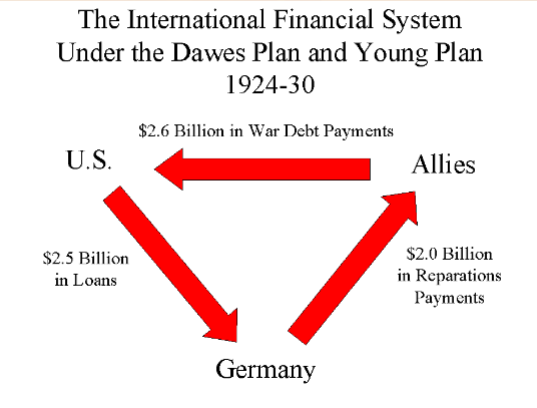Lecture 11-The Great Depression
1/7
There's no tags or description
Looks like no tags are added yet.
Name | Mastery | Learn | Test | Matching | Spaced |
|---|
No study sessions yet.
8 Terms
warning signs of the great depression
western world market troubled
Euro nations devastated after WWI
brit & france repaying US loans
germany $33bill war debr
international sales of US goods decreased
signs of economic danger
steel/car demand decline
ag struggle
high debt rates from consumer goods craze
pop to buy stock on credit
stock overvalued
Circle of Debt

The Crash
Black Monday & Black Tuesday
oct 28-29, 1929
market fluctuating, panic begins
ppl sold shares
Dow dropped 23 pts
16 mill shares traded
$30bill lost ($375 bill today)
market dropped until ‘32, wasn’t completely over until 40s
Many rich and middle class reduced to poverty
banks/businesses foreclosed, some suicidal
Suffering—City
Working class suffered most
mill lost jobs bc companies lost $ and downsized
unemployment at 12 mill, 25% of total pop
workers hrs/salary declined
specifics
many lived in shacks/street
food from soup kitchens, garbage
pawning possessions
charities swamped
hobos—men who wandered around begging and looking for odd jobs
Suffering—Country
farm produce demand decreased after WWI
low price, too much
depression worsened farmers lot
thousands closed
mill of farmers homeless
those w farms & crops had few purchasers for the products
surplus wasn’t distributed to the hungry in cities or rural areas
tenants and sharecroppers hardest hit
malnutrition and disease
The Dust Bowl
Kansas, Oklahoma, Texas, Arkansas, Iowa, South Dakota, Colorado, New Mexico
farming on prarie caused soil erosion
terrible droughts
huge dust clouds covered area
almost impossible to grow crops
many migrated to CA for work but few found it
The Grapes of Wrath (1939)—John Steinbeck’s novel
family migrated from Oklahoma to California
detailed severe hardships
1940 pop film
Family
unemployed men
brought up in independent hardworking culture
emotional crisis of inferiority and guilt
some left fams
others ashamed to ask for help
most feared losing respect/love of wife and children
women’s work
some managed to keep low paying service jobs
1930/40—women in work increased 25%
young couples put off marriage and had fewer children
Blaming Pres Hoover
not his fault but was blamed, progressive for his era
met w business leaders to convince them to keep production and wages stable
did not work bc products weren’t selling
Hoover cautious ab creating gov assistance programs
gov aid to struggling banks and companies
jobs didnt increase
no federal assistance for indivs